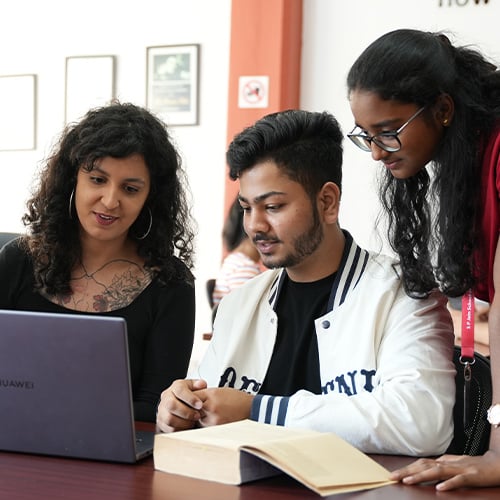
BEC: Program structure
CRICOS Provider Code: 03335G | CRICOS Course (BEC) Code: 086184J
Program structure & curriculum

Program structure and curriculum
The program offers a strong foundation in economics and business, steadily building towards career-focused learning in contemporary economics. It combines rigorous theory with practical projects, ensuring you graduate with both knowledge and experience.
In Year 1, you’ll develop the fundamentals of management, economics, communication, and sustainability, while also gaining first-hand exposure through the Regional Immersion Project. This year sets the stage for deeper exploration by grounding you in core concepts and practical skills.
As you progress to Years 2, the curriculum shifts to advanced and specialised subjects such as econometrics, financial markets, big data, climate change economics, and digital-era policy. You’ll apply analytical tools, test ideas in live projects, and learn to evaluate and shape economic strategies.
Your learning journey will culminate in a Capstone Project in the final year—an intensive research-driven project focusing on contemporary economic issues.
ASSESSMENT METHODS
A range of planned ongoing assessment methods and tools have been used in the design of each unit of study (subject) towards providing adequate assurance of the unit learning outcomes and the overall alignment of the assessments to achieve the program learning outcomes. Assignments are both individual and group-based, varying across units. The assessment criteria are designed to gauge the intended learning outcomes of the unit. To learn more about our assessment methods, please refer to the Student Handbook.
PROJECTS
Projects are an integral part of the BEC learning experience. They allow you to apply theory to practice, test ideas in real-world settings, and graduate with hands-on experience.
- Regional Immersion Project (Year 1, Semester 2 )
In your first year, you’ll step out of the classroom to learn the essential skills for conducting a project in real-world business context. Starting with an overview of the project, students will form teams, develop project proposals, and receive training on interview techniques and survey design. Throughout the course, students will work collaboratively on data collection and analysis, present mid-term progress reports, and deliver final presentations. The unit will culminate a comprehensive final report, integrating insights gained during the project
- Capstone Project (Final Semester (Semester 7)
The Capstone Project is the culmination of your academic journey. The project involves research, analysis, problem-solving, and creative work and effective communication. Working independently and under the guidance of your faculty mentor, you’ll undertake a substantial research-driven project focused on contemporary economic issues and topics. challenging you to synthesise what you have learned—economic theory, quantitative skills, and critical thinking and apply these learnings.

SP Jain
Graduate attributes and program learning outcomes

Graduate attributes:
All SP Jain Global programs are designed so that our graduates display the much needed and holistic attributes including:
- Knowledge of Business, Management and Emerging Technologies
- Research and Business Intelligence
- Problem Solving and Decision Making
- Creativity and Innovation
- Intercultural Competence/Communication
- Teamwork
- Global Citizenship/Ethics (Collaborate, Negotiate and Resolve Conflicts)
BEC program
Program learning outcomes
Graduates of the BEC program will: :
| Contemporary Knowledge of Economics | Display comprehensive and current knowledge of the fundamental and contemporary advances in economics and various business settings. |
| Critical Thinking and Analytical Skills | Use critical thinking and quantitative skills to examine economic and business data and events to provide analysis and insights. |
| Problem Solving and Creative Skills | Develop problem solving and creative thinking skills to identify and provide innovative, ethical, sustainable and responsible solutions to problems in business, economies and society. |
| Communication and Team Skills | Demonstrate strong oral and written communication skills to convincingly present, individually and as a team member, analysis and solutions to diverse audiences. |
| Graduates of Bachelor of Economics will demonstrate the application of knowledge and skills: | Application Competency and Accountability Apply knowledge and skills in economics to practical situations and projects with a high level of personal autonomy, accountability, and initiative. Professional Practice Competency Collaborate as a team member to apply, and where required, adapt knowledge and skills in economics to provide analysis and proposed solutions for a range of real-world issues and opportunities. |
